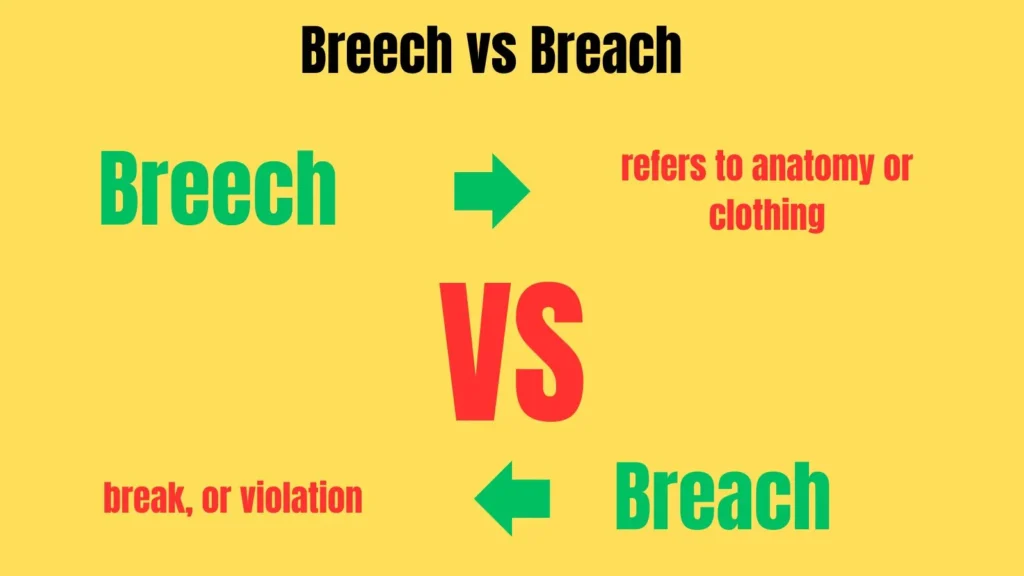Language is full of subtle nuances and intricate details, and some words are more likely to cause confusion than others. A prime example is the pair “breech” and “breach.”
Despite their similar pronunciation, these words have distinct meanings and applications. Understanding their differences is crucial for clear and effective communication.
“Breech” refers to anatomy or clothing, while “breach” signifies a gap, break, or violation—master their usage for clear communication!
This comprehensive guide will delve into the origins, usage, and common pitfalls associated with these two terms.

Historical Origins and Etymology
The Historical Roots of “Breech”
The term “breech” has its origins in Old English. Historically, it referred to the buttocks, a term used in various contexts related to clothing.
The word “breech” is derived from the Old English brēoc, meaning “buttocks.” Over time, it evolved to describe the part of the body, as well as garments designed to cover the lower body, such as “breeches.”
Evolution of “Breech”
- Old English: brēoc (buttocks)
- Middle English: breches (lower body clothing)
- Modern Usage: Refers to the part of the body and specific clothing items
The Historical Roots of “Breach”
On the other hand, “breach” has its roots in Old English bryce, which means “a breaking.” This term has been used since the early 14th century to describe a gap, break, or violation.
The evolution of “breach” reflects its application in both physical and metaphorical contexts, from military breaches to legal violations.
Evolution of “Breach”
- Old English: bryce (breaking)
- Middle English: breche (gap or violation)
- Modern Usage: Describes a break in a physical barrier or a violation of rules
Common Misuses and Confusions
Identifying Common Errors
Confusion between “breech” and “breach” often arises due to their similar pronunciation. This mix-up is common in both written and spoken language. Here are some typical examples:
- Medical Context: Referring to a “breech birth” when “breach” is intended.
- Legal Context: Using “breech of contract” instead of “breach of contract.”
- Everyday Usage: Saying “a breech in the wall” instead of “a breach in the wall.”
Why These Mistakes Occur
The primary reason for these errors is phonetic similarity. When spoken quickly, “breech” and “breach” sound almost identical, leading to confusion. Additionally, both words have evolved from different roots but ended up in similar contexts, compounding the issue.
Tips to Prevent Misuse
Understanding Contextual Usage
A fundamental step in preventing misuse is understanding the contextual differences between “breech” and “breach.” Here’s a breakdown:
- Breech: Refers to something physical, such as the buttocks or specific clothing.
- Breach: Refers to a gap, break, or violation, often used metaphorically.
Breech: Physical Reference Point
Breech is primarily used in contexts related to anatomy and clothing. For instance:
- Medical Context: A “breech birth” occurs when a baby is born bottom-first rather than head-first.
- Historical Clothing: “Breeches” are a type of clothing that covers the hips and legs, popular in historical fashion.
Breach: Metaphorical and Literal Divide
Breach covers both physical and metaphorical gaps or violations:
- Physical Breach: A gap in a wall or barrier, such as a “breach in the dam.”
- Metaphorical Breach: A violation of rules or agreements, like a “breach of contract” or a “breach of trust.”
Visual Mnemonics and Memory Aids
Visual Mnemonics for “Breech” vs. “Breach”
To help differentiate between these terms, consider the following visual aids:
- Double ‘EE’ for “Breach”: Think of the two E’s as representing a gap or space, indicating a breach or break.
- ‘Ch’ in “Breech”: Associate the ‘ch’ with the word “buttocks” to remember it refers to something physical.
Examples of Visual Cues
- Breech: Picture historical breeches (clothing) covering the legs.
- Breach: Visualize a crack or gap in a wall or a torn contract.
Examples in Literature and Common Phrases
Literary Examples
Both “breech” and “breach” appear in various literary works, often illustrating their different meanings:
- Breech: Used in historical literature to describe attire or anatomy.
- Breach: Common in legal and dramatic literature to denote violations or gaps.
Common Phrases and Idioms
Here are some common phrases where these words are used:
- Breech: “Breech-loading rifle” (a firearm that is loaded through the rear).
- Breach: “Breaching the contract,” “breach of security.”
Cultural References and Their Impact
Cultural Impact on Usage
Different cultures might interpret these terms in varied ways, impacting how they are used and understood:
- English-Speaking Cultures: Typically distinguish clearly between the two terms.
- Non-Native Speakers: May struggle with these words due to phonetic similarities and different linguistic backgrounds.
Examples from Various Cultures
In some languages, the distinction between “breech” and “breach” might not be as pronounced, leading to different uses or interpretations:
- Spanish: “Brecha” can mean both a gap and a breach, leading to confusion.
- French: Uses “brèche” for both physical and metaphorical breaches, which can blur the lines.
People Questions
1. What does “breech” mean?
“Breech” refers to something physical, such as the buttocks, a position in childbirth (breech birth), or historical clothing like breeches.
2. What does “breach” mean?
“Breach” refers to a gap, break, or violation, such as a “breach in a wall” or a “breach of contract.”
3. How can I remember the difference between “breech” and “breach”?
Think of “breech” as related to the body or clothing, and “breach” as a gap or rule violation. Visualize the double ‘EE’ in “breach” as a gap.
4. Can “breech” and “breach” ever be used interchangeably?
No, they have distinct meanings and contexts. Mixing them up can lead to confusion or errors.
5. What are common phrases with “breech” and “breach”?
- Breech: Breech birth, breech-loading rifle.
- Breach: Breach of contract, breach of trust, breach in the wall.
Conclusion
Understanding the difference between “breech” and “breach” is crucial for clear and precise communication.
By recognizing their distinct meanings—breech for physical references and breach for gaps or violations—you can avoid common pitfalls and improve your language skills.
Remember these key points:
- Breech: Pertains to physical aspects or historical clothing.
- Breach: Refers to gaps, breaks, or violations in various contexts.
With this knowledge, you’ll navigate the complexities of English more confidently and accurately.

Sophie Mitchell, a seasoned English educator, brings her passion for language and years of teaching expertise to TalkSpeaker. With a knack for simplifying grammar and expanding vocabulary, she empowers learners to master English with confidence.




